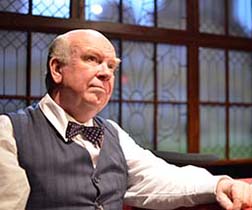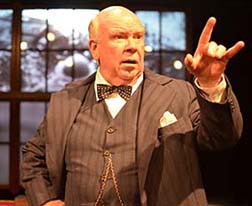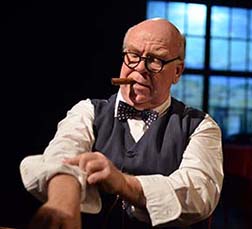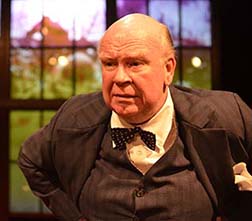
Lucy
Komisar
| Ronald Keaton's "Churchill" aristocratic hero of wartime Britain & no friend of workers
“Churchill.” The back story of "Churchill," the solo play finely adapted and performed by Ronald Keaton, is class politics. Though I’m not sure the author meant it that way. Winston Churchill was to the manor born. His grandfather was the Duke of Marlboro and Viceroy of Dublin, his father Henry Spencer-Churchill (Lord Randolph) was a conservative member of parliament who hadn’t done well at Eton. Winston couldn’t get into college and took the exam three times to finally get into Sandhurst, the British military academy. Privilege screams. Keaton is very good as the middle aged Churchill, offering a view of the man that shows personal sensitivity as well as political astuteness. And director Kurt Johns, moving Churchill through time and the backdrop slides seen through large windows, makes you forget there is only one performer in the space.
Churchill starts out typical Brit upperupper. He recalls that he was closest to his nanny, and declares that, "She'd lived such an innocent and loving life in service to others that she had no fears at all and did not seem to mind very much. She'd been my dearest and most intimate companion for all of the first twenty years that I'd lived." What the upper class thinks of servants who don’t seem to mind very much that they have no lives of their own!!! His own father apparently cared much less about him. He says he had five conversations with his father over his lifetime. He was sent to boarding school at 7 and recalls a sadistic headmaster who flogged students with a cane. When he was at Harrow, his father never visited, and he died at 45. The inherited sickness of that upper class, the inbred cruelty, perhaps explains why Churchill despised socialism – a system that attempts to share wealth and opportunity, dominated by the very privileged, such as the Churchills, with the ordinary citizen.The set is a table with a red cloth and a couple of black leather chairs. The back windows are used for slides of place.
Keaton as Churchill is a slightly rotund fellow. He is dressed in a striped suit and vest with gold watch chains. He doesn't sound like Churchill, but that's not important. He gives you the feeling of the man. The play starts in March 1946 and much is in flashbacks. After being wartime PM in Britain, he is defeated for reelection by a Laborite, Clement Attlee. We see him before an easel at Blenheim Palace, home of his grandfather, the Duke of Marlboro. It's not explained why he was defeated. Well, the war was over, maybe Brits who had suffered a lot didn't feel the need to suffer more at the hands of a conservative aristocrat who despised socialism. So, flashbacks. He holds a cigar he picked up in Cuba where he went as a military office. Then he is assigned to India. He writes a best seller, then goes to Sudan and with influence – influence is always important — gets onto that commander's staff. He sends columns to a newspaper. He makes money from a book on Sudan, resigns his commission and runs for parliament in 1898. What else could an upper class boy trained only in war do?
Churchill wins in 1900 and in 1901 enters the House of Commons as
a member of the Conservative party. Then curiously he switches to
the Liberals of Lloyd George, the son of a Welsh coal miner. The party
supports legislation that FDR incorporates into the New Deal. Churchill
says, "I was regarded as a traitor to my class." Lloyd George
makes him secretary of state, then First Lord of the Admiralty. He
is prescient about World War I and fights in France. There's no clear
explanation of why Churchill changed his stripes. Still, Churchill doesn’t have to scrounge for a job. At his
Chartwell estate, he paints and keeps race horses. And switches back
to the Conservative party.
After the war, when there are calls for his retirement, he says, "I leave when the pub closes." But, one can appreciate the Sandhurst military man’s achievement in wartime without wanting the hater of socialism and the patronizer of his nanny to run the peace. Back in Chartwell, Churchill gets an invitation from U.S. President
Truman to speak in Fulton Mo. There, he gives his famous Iron Curtain
speech: "From Stettin in the Baltic to Trieste in the Adriatic,
an iron curtain has descended across the continent." The speech
announces the beginning of the Cold War.
|
| museums | NYTW mail | recordings | coupons | publications | classified |




